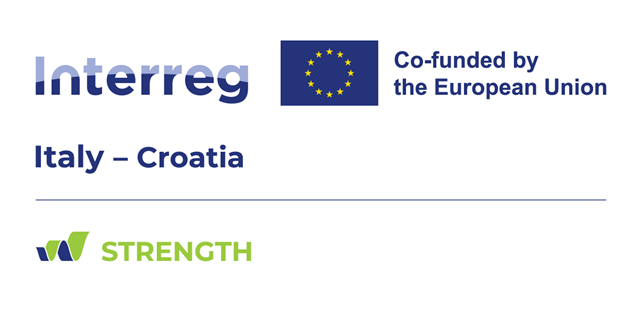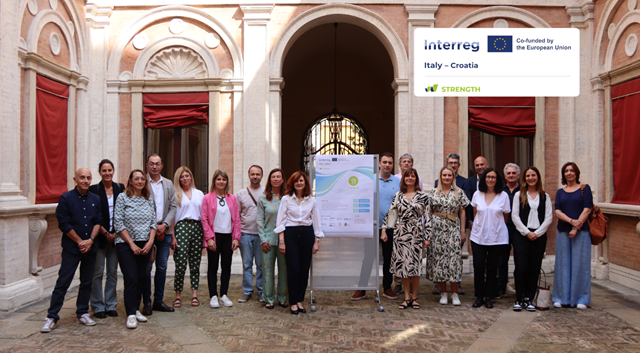
STRENGTH
STRategies for assessing climate change and natural hazards' impact on urban ecosystems, increasing resilience to ENvironmental hazards, and promoting territorial GrowTH
Climate change is a truly global risk. It affects population worldwide and is sometimes a product of modern society and technology advances.
Conventional risk-thinking is top-down, expert-led, adopts hazard-by-hazard analyses that do not take into account past hazard knowledge and citizens’ perception and attitudes.
STRENGTH is an Interreg Project that addresses the Specific Objective 2.1 of the Italy-Croatia Programme (Climate change adaptation and environmental risk prevention) with a broader and more effective approach.
The aim of STRENGTH is to enhance the resilience of the coastal and urban ecosystems towards drought, flash and coastal floods, and earthquakes.
The STRENGTH Project is based on a solid partnership of the following eight Italian and Croatian entities working in close synergy:
- University of Ferrara - Department of Engineering;
- University of Split, Faculty of Civil Engineering, Architecture and Geodesy;
- University of Split, Faculty of Electrical Engineering, Mechanical Engineering and Naval Architecture;
- National Institute of Oceanography and Applied Geophysics – OGS;
- Ferrara Plain Reclamation Consortium;
- Public Institution RERA SD for coordination and development of Split Dalmatia County;
- Municipality of Ravenna;
- City of Kastela.
The cross-border collaboration is crucial because each partners has its specific, non-overlapping, complementary, and high-level expertise.
The harmonization and integration of all the expertise is a key point of the project.
The specific common challenges that the project aims to address are:
- increasing resilience to sea-level rise, saltwater intrusion, and flash and coastal flooding, threatening the urban, agricultural, and environmental ecosystems located along the Ravenna, Ferrara, and Kastela coasts through common bottom-up operational strategies, emergency plans, and protocols;
- devising a digital strategy for monitoring and detection of structural damage applicable to the automatic recognition of the structural integrity state of masonry and concrete buildings and infrastructures and also for reliable seismic vulnerability analyses;
- developing a citizen engagement process and implementing trust in institutions, connecting risk authorities with at-risk communities;
- developing a communication framework to support collaborative risk participation between scientists, policymakers, stakeholders, and citizens.
The main original outcomes will be:
- cross-border diffusion of smart technologies for monitoring structures and infrastructures through digital and geophysical technologies;
- the design of strategies to be undertaken by public stakeholders to foster resilient urban ecosystems through assessment of the impact of natural and climate change hazards on the coastal zones of Ferrara, Ravenna, and Kastela;
- the development of a risk communication framework to support collaborative participation between scientists, policymakers, stakeholders, and citizens.
The STRENGTH project is designed to bring, with its actions and its outputs, important benefits to many and diversified target groups. Among these the main ones are:
- Local and Regional public authority;
- Sectoral agency;
- Infrastructure and (public) service provider;
- General public;
- Small investor involved in economic activities (SME).
The STRENGTH project contributes to the main European strategies and policies, including: the European Green Deal, the Next Generation EU strategy, the Agenda 2030, the EU Strategy for the Adriatic and Ionian Region, the River Basin Management Plans, the Italian National Recovery and Resilience Plan.
Project details
Project coordinator: Elena Benvenuti – University of Ferrara
Funding source: CBC Programme Italy-Croatia
Call: Interreg VI A Italy–Croatia Programme - 2021/2027 Standard (First call)
Programme priority: Green and resilient shared environment
Specific objective: 2.1: Promoting climate change adaptation and disaster risk prevention, resilience, taking into account eco-system-based approaches.
Duration: 30 months - Start date 01/04/2024 - end date 30/09/2026.
EU contribution - ERDF: 1.501.634,88 €
Total Budget: 1.877.043,60 €
Role of FGAG
Project partner, Work Package Leader of WP2 – “Assessment of vulnerability to natural hazards and climate change hazards”
FGAG Project Leader
Prof. Željana Nikolić, PhD. (zeljana.nikolic@gradst.hr)
STRENGTH Website: www.italy-croatia.eu/web/strength
Partnership


The international team of STRENGTH Project